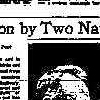Reflections on Progress, Peaceful Coexistence & Intellectual Freedom
“My reading and my discussions with Tamm (and others) had acquainted me with the notions of an open society, convergence, and world government... In 1968, I took my decisive step by publishing Reflections on Progress, Peaceful Coexistence, and Intellectual Freedom.”
The New York Times published the full text of Sakharov’s “Reflections” under the headlines, “Text of Essay by Russian Nuclear Physicist Urging Soviet-American Cooperation,” “Joint Action by Two Nations Viewed as Essential to Avert Perils Facing Mankind,” “Basis for Hope Seen in Rapprochement between Socialist and Capitalist Systems.”
The opening paragraphs of the essay can be found here.
“My essay outlined a positive, global program for mankind’s future; I freely acknowledge that my vision was somewhat utopian, but remain convinced that the exercise was worthwhile.”
“I wanted to alert my readers,” Sakharov recalled, “to the grave perils threatening the human race – thermonuclear extinction, ecological catastrophe, famine, an uncontrolled population explosion, alienation, and dogmatic distortion of our conception of reality. I argued for convergence, for a rapprochement of the socialist and capitalist systems that could eliminate or substantially reduce these dangers, which had been increased many times over by the division of the world into opposing camps. Economic, social, and ideological convergence should bring about a scientifically governed, democratic, pluralistic society free of intolerance and dogmatism, a humanitarian society which would care for the Earth and its future, and would embody the positive features of both systems.
“I went into some detail on the threat posed by thermonuclear missiles – their enormous destructive power, their relatively low cost, the difficulty of defending against them. I wrote about the crimes of Stalinism and the need to expose them fully (unlike the Soviet press, I pulled no punches), and about the vital importance of freedom of opinion and democracy. I stressed the value of progress, but warned of the need for substantive changes in foreign policy.”


